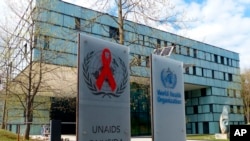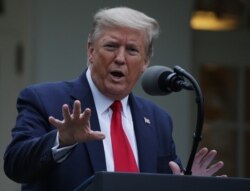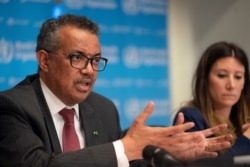President Donald Trump’s announced intention to halt U.S. funding to the World Health Organization is shining a new spotlight on the U.N. agency’s role in combating the coronavirus pandemic and whether it has been too deferential to China, where the virus first erupted.
WHO was one of numerous international organizations created as part of the U.N. in the years after World War II and for seven decades has played a key role in shaping the response to global health crises. Over the years, WHO has helped eradicate smallpox, reduced polio cases by 99% and been on the front lines of the battle against such outbreaks as Ebola.
But the controversy over Trump’s bid to halt the estimated $445 million the U.S. contributes annually to WHO’s $4.8 billion budget — the most of any country — comes at a crucial time. There is no cure or vaccine – and may not be for months or a year – for the disease that as of Wednesday afternoon EDT had killed more than 133,000 people around the globe.
Trump, who has blamed U.S. state governors for not stockpiling medical equipment needed to treat coronavirus patients, himself downplayed the threat the coronavirus posed to the United States for weeks earlier this year before declaring a national emergency in mid-March.
In halting U.S. support for WHO, Trump blamed its deference to China, one of the agency’s key funding countries, for keeping the world from reacting faster to the pandemic.
First report
After China first reported a mysterious but small number of pneumonia cases December 31, WHO said in early January that it had asked for more information from Beijing but advised “against the application of any travel or trade restrictions on China based on the current information available on this event.”
In late January, WHO Director-General Tedros Adhanom Ghebreyesus sat alongside Chinese President Xi Jinping in Beijing's Great Hall of the People and praised China’s response to the coronavirus crisis.
“We appreciate the seriousness with which China is taking this outbreak, especially the commitment from top leadership, and the transparency they have demonstrated," Tedros said. Chinese state media quoted the comments for weeks.
Trump, at Tuesday night’s coronavirus briefing, said, "With the outbreak of the COVID-19 pandemic, we have deep concerns whether America’s generosity [to WHO] has been put to the best use possible."
Here is a primer on WHO:
The agency was founded in 1948 and now is run by 194 member states. It was created to coordinate international health policy for the United Nations, particularly on infectious diseases.
Each country sends health experts to represent it in the World Health Assembly, WHO’s decision- and policymaking body. The assembly meets annually in Geneva.
WHO has regional headquarters in Africa, North and South America, Southeast Asia, Europe, the Eastern Mediterranean and the Western Pacific. It has 7,000 employees spread across 150 field offices throughout the world.
Structure, funding criticized
Despite WHO’s success in helping eradicate smallpox and all but eliminating polio, the agency has drawn criticism over the years as too bureaucratic, badly structured and too dependent on major donors.
WHO acknowledged its poor response to the 2013-16 Ebola outbreak in West Africa. The agency took five months to declare a public health emergency of international concern over Ebola. One academic assessment said the delay "undoubtedly contributed to the unprecedented scale of the outbreak."
In 2014, former WHO consultant Charles Clift wrote that the agency "is too politicized, too bureaucratic, too dominated by medical staff seeking medical solutions to what are often social and economic problems, too timid in approaching controversial issues, too overstretched and too slow to adapt to change."
WHO gets its funding from throughout the world, but only partly from individual countries. International organizations, private donors and its parent organization, the U.N., also fund WHO.
Each member state in WHO pays dues based on the country’s wealth and population. But these dues constitute only about a quarter of WHO’s funding. The remainder comes from voluntary contributions, effectively donations from countries around the world or individual donors.
US tops donor list
The U.S. is the biggest donor, giving $893 million in the two-year, 2018-19 funding cycle. Of that figure, $237 million came from required membership dues and $656 million from donations.
The second-biggest national donor, the United Kingdom, paid $434.8 million in dues and donations during that same time span. China contributed nearly $86 million.
The U.S. voluntary donations amounted to nearly 15% of the world total. The second-biggest donor was the Bill and Melinda Gates Foundation, buttressed by Bill Gates’ wealth as co-founder of Microsoft Corp.






